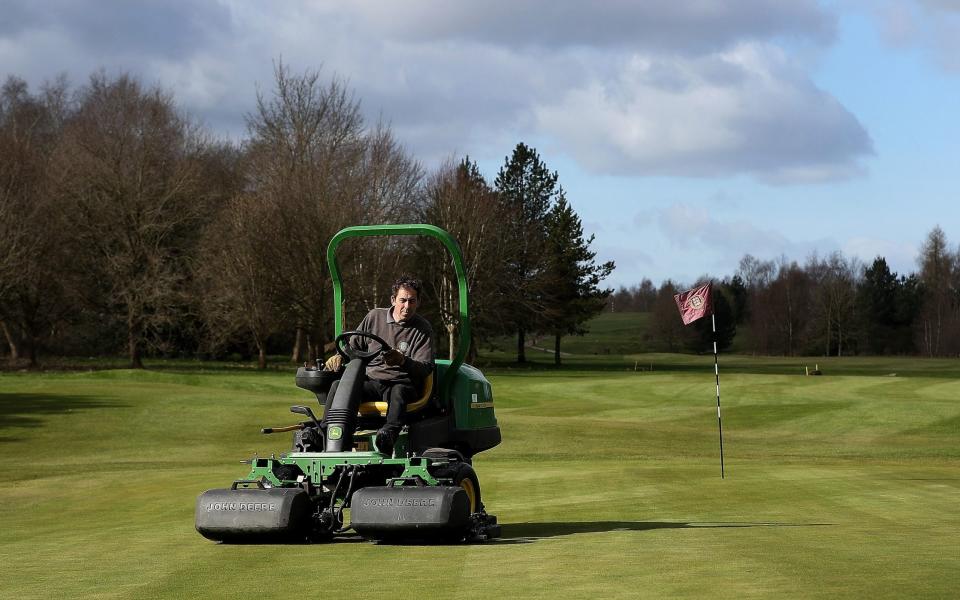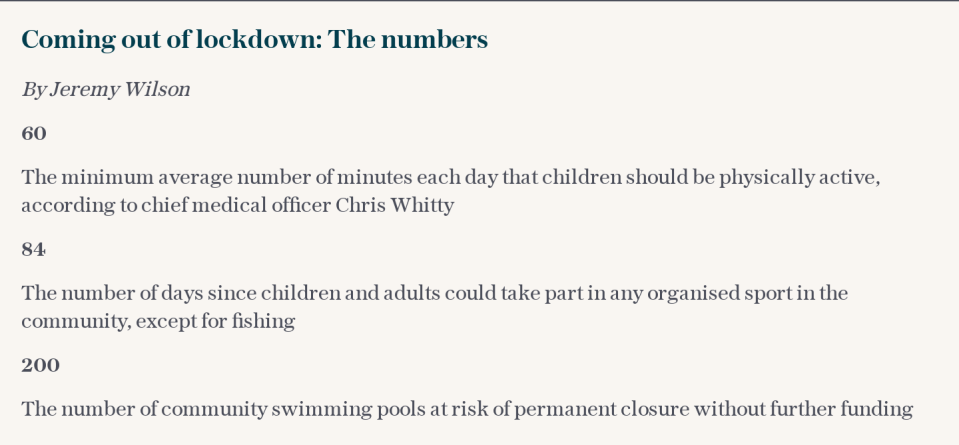'Extraordinarily low' risk of catching coronavirus as golf and other sports return

Are you returning to your sport club today? Leave a comment below to let us know how your life will change with the relaxed lockdown restrictions
The risk of catching Covid-19 from playing outdoor sport is “extraordinarily low” and there were no known cluster outbreaks when sports returned, according to medical experts.
With organised sport resuming again on Monday following the third national lockdown, individual governing bodies have each designed their own Covid-secure guidance to reduce risk and ensure that their activities will not be forced to shut down again.
A series of studies have analysed the risk factors involved with playing sport and the repeated message is that the biggest potential for problems lies not with the activities themselves but if protocols around spectating, travel, changing and socialising are not followed.
“From the data we have looked at, and the work that has been done on back to play protocols, the risk of playing outdoor sport is extraordinarily low,” said Professor Mike Weed of Canterbury Christ Church University.
“It seems from what we know last summer that the protocols did mitigate against cluster outbreaks. There have been no examples of any significant cluster outbreaks.
“The risk comes from the things around it and potentially bringing together groups of adults if it is kids’ sport. Even then, to be honest, those risks can be mitigated and are not hugely significant in the overall scheme of things. Grassroots sports can get demonised a bit — pictures of big crowds or groups of people can get people up in arms. But, if you look at it objectively, the risks are lower than what many people are doing as part of their everyday lives.”
There are essentially three ways of catching Covid-19 — from droplets, surfaces or aerosols. But, according to Prof Weed, there is “more and more recognition” that aerosol is probably the primary transmission route and “it is virtually irrelevant outside”. Indeed, in his wider study of how Covid-19 has been spread, Prof Weed said there were “very few — almost negligible — examples of outdoor transmission in everyday life”.
His work has helped to inform Parkrun’s protocols for its return for children in April and then adults in June. Key advice has been to mitigate the high density of participants at the start-line and also the time spent waiting together. “Once the event starts people spread out — that they are all facing the same way mitigates the risk as well,” he said.
Professor James Calder, who is the chairman of the government’s committee on the return of elite sport, also said that there had been no known cases of transmission on the football pitch. Analysis in rugby union and rugby league has also suggested that the virus is not being spread during the contact that may occur during the game and that off-field mixing represents the main risk.
In Scotland, there was such confidence in the low risk of outdoor transmission that golf and tennis continued even during the third lockdown.
“We need restrictions where we know transmission occurs more often and less restrictions where it is safer,” said Professor Devi Sridhar, who has been advising the Scottish government. “Outdoor transmission is minimal we know - especially with distancing for outside sports.”
New Government drive for children's activity
The Government has launched a national push to get children active for at least one hour every day as part of the long-awaited return of outdoor grass-roots sport.
With golfers and tennis players already inundating their clubs with bookings for the big reopening today, some of the nation’s biggest sports stars joined the Government in urging people to maximise the numerous health benefits of sport and physical activity.
The Telegraph’s Keep Kids Active campaign successfully pushed for children’s sport to be prioritised when lockdown restrictions were eased and the Government has also now committed more than £10 million to opening up school sport facilities outside of teaching times.
Children’s activity levels have been badly impacted by the three national lockdowns, with more than half of all children failing to reach the recommended daily average of at least 60 minutes of activity.
“The long wait is over – I urge everyone to get their trainers on, get outside and enjoy all of the positive benefits sport can bring,” Culture Secretary Oliver Dowden said. “We want to see children be active 60 minutes a day, and adults 2½ hours a week to help us build back fitter, healthier and happier from this pandemic. Sport and physical activity will be at the heart of our national recovery and today marks a really important step forward.”
Prime Minister Boris Johnson called for a “Great British summer of sport” and acknowledged the sacrifices that had been made this past year by children.
England men’s World Cup-winning cricket captain Eoin Morgan, British No 1 women’s tennis player Johanna Konta, England rugby union prop Kyle Sinckler and England netball player Serena Guthrie joined the call to get active. Sports facilities including football and cricket pitches, tennis and basketball courts, outdoor swimming pools, golf courses and sailing clubs can all reopen today. Organised outdoor team sports can also resume ahead of the Easter holiday break.
The Lawn Tennis Association has already reported surging interest. “We’ve started a new club because of this wave coming in,” said Dan Travis, a tennis coach based at Brighton’s Preston Park. Leeds’s city courts experienced an extraordinary boom last year, with 48,000 bookings made as opposed to only 8,000 in 2019. The LTA also reports record-breaking sign-ups for local tennis leagues in 2021, which already have more participants confirmed than during the whole of last year.
Tim Barnes, who co-owns and runs two courses in Cheshire, also highlighted the demand within golf. “I’ve just had a text from one member asking that if he shines his car headlights down the first at 12.01am, he could hit a shot,” he said. “We are pretty much booked up for the whole week.”
Other sports, however, are facing major challenges. With indoor swimming pools closed for so much of the past year and unable to reopen until next month, Swim England has warned that as many as 200 facilities could be lost permanently without bespoke government support. There is particular concern over the knock-on impact of a generation of children who risk missing their statutory school swimming lessons.
“There aren’t enough pools in the country as it is, and the impact of Covid has been monumental,” said Steve Parry, a medallist at the 2004 Athens Olympics. “We weren’t doing particularly well prior to Covid when one in four children left school unable to swim, but the pandemic has heightened the problem. Every youngster has the right to learn how to swim and know how to stay safe in the water.”


 Yahoo Sport
Yahoo Sport 




































